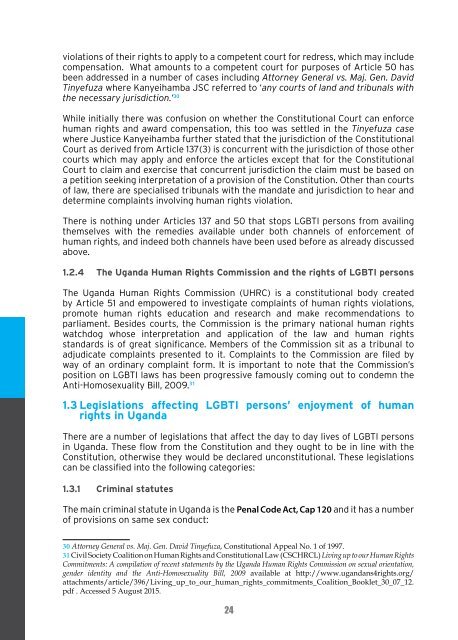PERSONS IN UGANDA
4Tks5WfQb
4Tks5WfQb
Create successful ePaper yourself
Turn your PDF publications into a flip-book with our unique Google optimized e-Paper software.
violations of their rights to apply to a competent court for redress, which may include<br />
compensation. What amounts to a competent court for purposes of Article 50 has<br />
been addressed in a number of cases including Attorney General vs. Maj. Gen. David<br />
Tinyefuza where Kanyeihamba JSC referred to ‘any courts of land and tribunals with<br />
the necessary jurisdiction.’ 30<br />
While initially there was confusion on whether the Constitutional Court can enforce<br />
human rights and award compensation, this too was settled in the Tinyefuza case<br />
where Justice Kanyeihamba further stated that the jurisdiction of the Constitutional<br />
Court as derived from Article 137(3) is concurrent with the jurisdiction of those other<br />
courts which may apply and enforce the articles except that for the Constitutional<br />
Court to claim and exercise that concurrent jurisdiction the claim must be based on<br />
a petition seeking interpretation of a provision of the Constitution. Other than courts<br />
of law, there are specialised tribunals with the mandate and jurisdiction to hear and<br />
determine complaints involving human rights violation.<br />
There is nothing under Articles 137 and 50 that stops LGBTI persons from availing<br />
themselves with the remedies available under both channels of enforcement of<br />
human rights, and indeed both channels have been used before as already discussed<br />
above.<br />
1.2.4 The Uganda Human Rights Commission and the rights of LGBTI persons<br />
The Uganda Human Rights Commission (UHRC) is a constitutional body created<br />
by Article 51 and empowered to investigate complaints of human rights violations,<br />
promote human rights education and research and make recommendations to<br />
parliament. Besides courts, the Commission is the primary national human rights<br />
watchdog whose interpretation and application of the law and human rights<br />
standards is of great significance. Members of the Commission sit as a tribunal to<br />
adjudicate complaints presented to it. Complaints to the Commission are filed by<br />
way of an ordinary complaint form. It is important to note that the Commission’s<br />
position on LGBTI laws has been progressive famously coming out to condemn the<br />
Anti-Homosexuality Bill, 2009. 31<br />
1.3 Legislations affecting LGBTI persons’ enjoyment of human<br />
rights in Uganda<br />
There are a number of legislations that affect the day to day lives of LGBTI persons<br />
in Uganda. These flow from the Constitution and they ought to be in line with the<br />
Constitution, otherwise they would be declared unconstitutional. These legislations<br />
can be classified into the following categories:<br />
1.3.1 Criminal statutes<br />
The main criminal statute in Uganda is the Penal Code Act, Cap 120 and it has a number<br />
of provisions on same sex conduct:<br />
30 Attorney General vs. Maj. Gen. David Tinyefuza, Constitutional Appeal No. 1 of 1997.<br />
31 Civil Society Coalition on Human Rights and Constitutional Law (CSCHRCL) Living up to our Human Rights<br />
Commitments: A compilation of recent statements by the Uganda Human Rights Commission on sexual orientation,<br />
gender identity and the Anti-Homosexuality Bill, 2009 available at http://www.ugandans4rights.org/<br />
attachments/article/396/Living_up_to_our_human_rights_commitments_Coalition_Booklet_30_07_12.<br />
pdf . Accessed 5 August 2015.<br />
24


